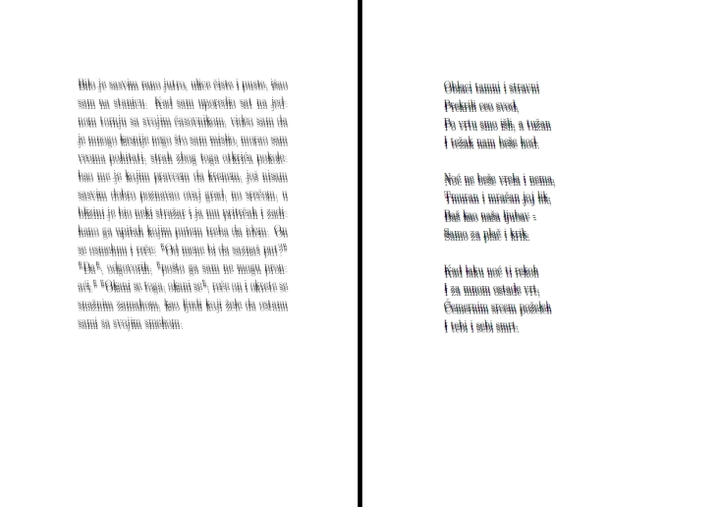Text layout and genre decision

This project was completed in collaboration with Petar Milin and Michael Ramscar.
People read texts of different genres differently (see here or here), but how do we even make this initial genre decision about a text we approach? Looking at the images above, which one would you say is a poem? And what if someone told you that the left text comes from a poetry anthology?
We investigated just how much genre decision depends on:
- objective text characteristics, namely text layout (prose versus verses and stanzas),
- external or contextual information about the text, which was in our case text source (e.g., poetry anthology, a school reading book, newspapers),
- previous experience the reader has with texts, expressed as expertise (students of literature versus STEM students).
We also blurred the lines of the texts to make them illegibile. This way, the actual content of the texts will not be influencing a person’s decision; all the information a reader has is about the layout of the text and its source.
At the same time, we conducted computational simulations that simulated different experience with texts of different genres students of literature would have in comparison to STEM students.
In short, we found that all three factors influence genre decision. Most interestingly, non-experts are somewhat more rigid than experts. Non-experts are less accepting of prose texts as poems and versed texts in stanzas as prose, despite the contextual information they may have. In other words, an expert is more ready to accept even a prose text as a poem if contextual information is suitable. This is because the more diverse pool of literary texts experts encountered, including, for example, prose poems, lead them to be less tied to some previously learned regimes of genre decision. These findings were also in line with the computational model predictions that I purposely avoid detailing here.
What does this all mean, then? In our view, this means that genres are learned and learned for a purpose. A person’s “performance” when encountering a new text depends on the quality and quantity of their previous experiences with texts and reading and is adapted to fit their daily needs. Experts and non-experts responded differently because they had different experiences with texts previously and because their usual genre decision goals are not the same.
If you want to know more about this, feel free to message me.